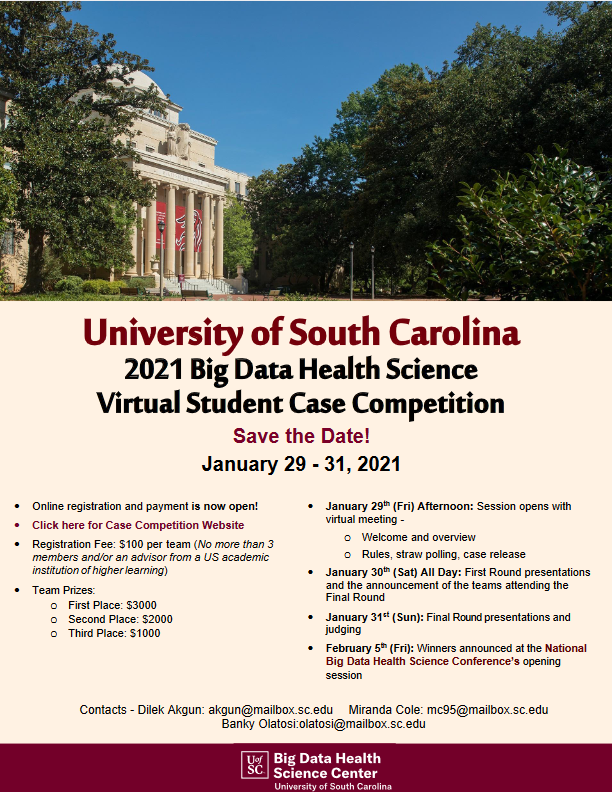The 2nd Annual Big Data Health Science Case Competition will be held virtually between January 29– 31, 2021 before the University of South Carolina’s National Big Data Health Science Conference, scheduled for February 5– 6, 2021. Last year’s winner was Duke University, so it is time for others to compete to dethrone them. The Big Data Case Competition is intended to provide enthusiastic teams of graduate and senior undergraduate students with the opportunity to apply their knowledge to the analysis of big datasets in healthcare.
This year’s challenge will focus on solving the inappropriate use of healthcare using a data analytics approach. Each participating team will analyze the case and datasets. During this period, the teams must identify the most prominent issues and develop a strategy to address key issues to help healthcare organizations achieve their goals of reducing inappropriate care utilization. Team members will work together to present their methods, analyses, and results at the Big Data Health Science Center Case Competition virtually. A panel of industry and academic experts will judge the presentations based on each team’s use of full analytics tools/processes, from framing the problem to data use, model building, innovation and communicating the solutions to decision-makers.
Registration
Team registrations will be accepted on a first-come, first-served basis until January 22, 2021 or until 30 teams have registered (the maximum number of teams we can accommodate).
If you would prefer to be invoiced for this and would like to pay by check, please contact Joanne Zwemer at zwemer@mailbox.sc.edu.
Case Synopsis
This year’s case competition addresses the problem of inappropriate healthcare utilization, which costs the nation billions of dollars and puts patients at iatrogenic risks. The availability of anonymized statewide hospitalization data sets provides an opportunity for using machine learning techniques to solve healthcare problems. The student data science competition will focus on generating new algorithms and analytic tools that may help in:
- Identifying clusters of inappropriate care using hospitalization data,
- Identifying predictors of inappropriate care, and
- Predicting future inappropriate care visits, such as ambulatory care sensitive conditions that present at the emergency department.
Competition Format & Case Analysis
- The competition will be conducted only in English.
- Students will receive competition rules, the data sources, team assignments after virtual polling and receive a power point presentation template on the first day of the case competition on January 29, 2021 at 12:00pm Eastern Standard Time.
- Each team will be given 24 hours to devise a solution for the case (January 30 [1st round] and 31st, 2021 [semifinals, and finals], to submit a Power Point presentation, and an executive summary. The time spent analyzing the case will be very intense and focused.
- Teams are expected to produce original work.
- Teams may not consult with non-team members during preparation of the case analysis or any time during of competition. This includes anyone outside of the team, faculty, advisors, staff, ambassadors, and fellow students.
- To further safeguard the integrity of the competition, students may be required to sign a non-disclosure agreement.
- Solutions from the top three “willing” winning teams will be packaged for conference abstract submissions and eventual publication in reputable academic journals.
Team Composition
- Participants must form a team of three members with an alternate at-large member.
- Each team will be comprised of currently enrolled undergraduate and/or graduate students from any accredited university or institution of higher learning in the U.S.
PowerPoint Presentation
- Teams must submit a solution proposal of up to 12 Power Point slides (including cover and index) and teams are allowed no more than 4 additional slides of appendices.
- Teams must also submit an executive summary. The written executive summary must highlight the key points/approach of the team’s solution for the case study in a two-page narrative format. All summaries will be judged and scored in advance of the presentation by a panel of judges.
- The written executive summary should not exceed two pages.
- The summary must use Times New Roman 12-point font and must be single-spaced.
- Teams will need to copy both the PowerPoint file and Executive Summary and upload it onto the portals provided for the presentation.
Tentative Virtual Oral Presentation Rules
- Each team will use PowerPoint slides to give live oral presentation on the day of the competition (January 30 -31, 2021). The presentations may not be longer than 15 minutes.
- A pre-recorded copy of the presentation must be made available as a back-up in case technology fails during the live session.
- Additional 15 minutes will be allotted for Q&A. If a team finishes its presentation early, it will proceed with its 15-minute question-and-answer session.
- A panel of judges will ask questions they deem appropriate and judge the presentation.
- Teams can introduce themselves to the judges during the 5-minute setup period.
- All team members are expected to offer an equal share of the presentation.
- Dress is business professional.
- Teams will not be allowed to observe other team presentations during the preliminary rounds. Once eliminated, teams can observe all subsequent presentations.
Judging
- Each team presentation will be judged by a panel of three to seven judges. These judges will be composed of industry and academic representatives.
- A confusion matrix or similar measure for model performance will be used to score each team’s final product.
Prizes
- First Prize $3,000
- Second Prize $2,000
- Third Prize $1,000
Award money will be split equally among winning team members. Winning teams will be announced and formally presented during the opening session on Friday Feb 5, 2021 during the virtual National Big Data Health Science Conference SC.

